

| ETERNUS SF AdvancedCopy Manager Operator's Guide for cluster environment 13.0 -Microsoft(R) Windows(R) 2000/Microsoft(R) Windows Sever(TM) 2003-, -Solaris-, -HP-UX-, -Linux-, -AIX- |
Contents
Index
 
|
This chapter provides an overview of cluster systems.
A cluster system uses two or more server machines as a single virtual server machine to provide high level of availability.
In single-server machine operation, if the server machine or an application running on the server machine stops, the machine or the application must be restarted. During this time, operation stops.
A cluster system, however, uses two or more server machines. If a failure occurs on one server machine or an application running on the server machine, the transaction can be resumed immediately by restarting the application on the other server machine. As a result, transaction down time is reduced. The switching a transaction from a server with a problem to another server that is operating normally is referred to as failover.
In the cluster system, the server machines are collectively called a cluster, and each server machine in the cluster is called a node.
The cluster operation is classified into one of the following types. This type is explained in "Names of Fujitsu PRIMECLUSTER."
Standby class
In the standby class, a standby node on standby exists to take over transactions from an active node, where transactions are being performed.
1:1 standby system
The cluster consists of one active node and one standby node. The active node performs transactions while the standby node is prepared to become the active node.
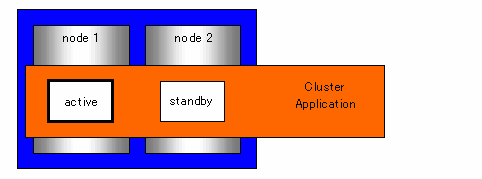
Mutual standby system
Cluster consisting of two or more nodes. Generally, two nodes are used as "active nodes." Each node performs its own transaction and, at the same time, stands by for the transaction of the other node. If either node fails, the other node takes over the transactions on both nodes.
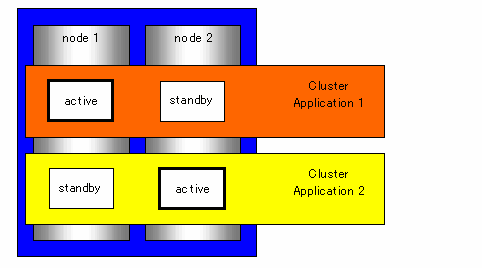
n:1 standby system
The cluster consists of n active nodes and one standby node. Each of the n active nodes performs separate transactions while a separate standby node stands by to take over for any failing active nodes.
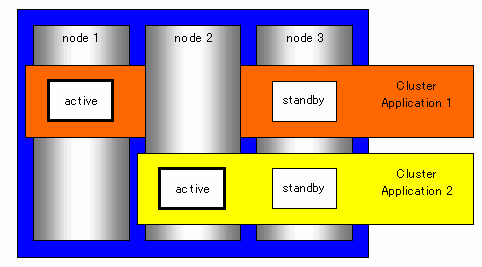
Cascade topology
It constitutes from three or more sets of nodes. One set of a node is an active node, and the remaining nodes are standby nodes.
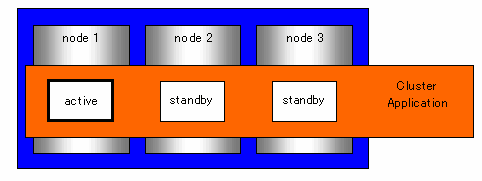
Priority transfer
It constitutes from three or more sets of nodes. One set of a node is an active node, one set of a node is standby node, and the remaining nodes are stop nodes.
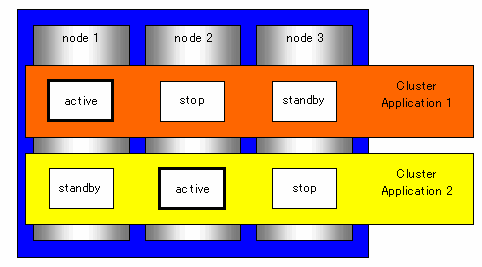
Scalable class
In the scalable class, the cluster is designed for performance improvement and degraded operation when a failure occurs by means of parallel processing on multiple server machines. In contrast to the standby system, nodes in this class of cluster are not divided into active and standby nodes. If a server in a cluster fails, the remaining servers in the cluster operate at a degraded level so that the transaction continues.
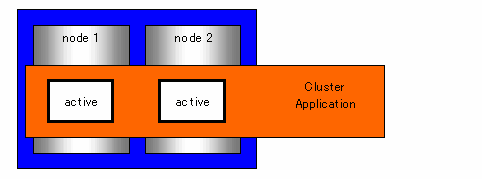

The cluster operation and operations name which are supported with a cluster system differ from each other. For more information, refer to the cluster software manuals.
AdvancedCopy Manager runs on the following operating systems:
|
Operating system |
Non Cluster |
Cluster |
||||
|
Storage management server |
Storage server |
Tape server |
Storage management server transaction |
Storage server transaction |
Tape server transaction |
|
|
Solaris(TM) 10 Operating system |
Support |
Support |
Not support |
Support |
Support |
Not support |
|
Solaris(TM) 9 Operating system |
Support |
Support |
Support |
Support |
Support |
Support |
|
Red Hat Enterprise Linux AS (v.3 for x86) |
Support |
Support |
Not support |
Support |
Support |
Not support |
|
Red Hat Enterprise Linux AS (v.4 for EM64T) |
Not support |
Support |
Not support |
Not support |
Support |
Not support |
|
Windows2000 Server SP4 |
Support |
Support |
Not support |
Support |
Support |
Not support |
|
Windows Server 2003 for Itanium based systems |
Not support |
Support |
Not support |
Not support |
Support |
Not support |
|
HP-UX 11.00, 11i, v2(PA-RISC), HP-UX 11i v2.0(Itanium) |
Not support |
Support |
Not support |
Not support |
Support |
Not support |
|
AIX 5L 5.1, 5.2, 5.3 |
Not support |
Support |
Not support |
Not support |
Support |
Not support |
AdvancedCopy Manager supports only the following cluster systems:
|
OS |
AdvancedCopy Manager version |
Cluster system and version |
|
Solaris |
AdvancedCopy Manager 13.0 |
Fujitsu SynfinityCluster V2.0 |
|
Linux |
AdvancedCopy Manager 13.0 |
Fujitsu PRIMECLUSTER V4.1A20 |
|
Windows |
AdvancedCopy Manager 13.0 |
Microsoft(R) Cluster Server |
|
HP |
AdvancedCopy Manager 13.0 |
MC/ServiceGuard A.11.13 |
|
AIX |
AdvancedCopy Manager 13.0 |
High Availability Cluster Multi-Processing 5.1 |

Refer to the manual of a cluster system about correspondence of the version of a cluster system, and the version of OS.
AdvancedCopy Manager Tape Server supports the following cluster systems:
|
OS |
AdvancedCopy Manager version |
Cluster system and version |
|
Solaris |
AdvancedCopy Manager 13.0 (Tape Server) |
Fujitsu PRIMECLUSTER V4.1 |
AdvancedCopy Manager supports the following operation types:
|
OS |
Cluster system |
1:1 standby |
n:1 standby |
Mutual standby |
Cascade topology |
Priority transfer |
Scalable class |
Combined operation with the scalable class |
|
Solaris |
SynfinityCluster |
Support |
Support |
Support |
Support |
Support |
Not support |
Support |
|
VERITAS Cluster Server |
Support |
Support |
Support |
Support |
Not support |
Not support |
Not support |
|
|
Linux |
PRIMECLUSTER |
Support |
Support |
Support |
Support |
Support |
Not support |
Support |
|
Windows |
Microsoft(R) Cluster Server |
Support |
Support |
Support |
Support |
Not support |
Not support |
Not support |
|
HP |
MC/ServiceGuard |
Support |
Support |
Support |
Support |
Not support |
Not support |
Not support |
|
AIX |
High Availability Cluster Multi-Processing |
Support |
Support |
Support |
Support |
Not support |
Not support |
Not support |

AdvancedCopy Manager cannot be operated in any operation type that is unsupported by the cluster system.
Backup and a replication of AdvancedCopy Manager can be employed about the operating volume of scalable employment. The employment method. For information about the employment method, see "Combined operation with the scalable class."
Storage management server transactions on the storage management server are supported only for standby system operation. None of the functions for Storage management server transactions can be used in mutual standby operation.
AdvancedCopy Manager supports the following operation types:
|
OS |
Cluster system |
1:1 standby |
n:1 standby |
Mutual standby |
Cascade topology |
Priority transfer |
Scalable class |
Combined operation with the scalable class |
|
Solaris |
PRIMECLUSTER |
Support |
Not support |
Not support |
Not support |
Not support |
Not support |
Not support |

Use AdvancedCopy Manager in a 1:1 active/standby configuration when using the AdvancedCopy Manager Tape Server.
This chapter explains the ways in which AdvancedCopy Manager operates in a cluster system.
In AdvancedCopy Manager, a component of a group that switches over to another by failover is called a cluster transaction. The name of the cluster transaction depends on the cluster system.
|
Cluster system |
Name of cluster transaction |
|
SynfinityCluster |
Cluster Service |
|
PRIMECLUSTER |
Cluster Application or userApplication |
|
VERITAS Cluster Server |
Service Group |
|
Microsoft(R) Cluster Server |
Cluster Group |
|
MC/ServiceGuard |
Package |
|
High Availability Cluster Multi-Processing |
Resource Group |
To back up a transaction volume for cluster operation by using AdvancedCopy Manager backup management or replication management, add an AdvancedCopy Manager to an objective cluster transaction. To back up the transaction volume in two or more cluster transactions as in the case of the mutual standby operation, add an AdvancedCopy Manager to each cluster transaction.
To recognize the transaction in which an executed AdvancedCopy Manager function (such as a backup management command) is included, AdvancedCopy Manager assigns a unique name (logical node name) to each cluster transaction. If an AdvancedCopy Manager command is executed with this logical node name specified in environment variable SWSTGNODE, the command recognizes and executes the objective cluster transaction.
When "Logical IP address" and "Communication daemon/service port number for transaction (stgxfws_ logical node name)" are set in the AdvancedCopy Manager server addition processing, the objective cluster transaction is added as a server of AdvancedCopy Manager.

The logical node name is a value used by AdvancedCopy Manager only. It does not link with a logical host name assigned by a cluster transaction and cluster system.
AdvancedCopy Manager can perform local disk (not in cluster operation) backup/replication with a cluster operation machine. A transaction where such a local disk backup/replication operation is performed is called a local transaction. The local transaction does not switch over to another by failure. Set this local transaction to perform local volume backup/replication that is not included in a cluster transaction.
A local transaction does not use a logical node name. If an AdvancedCopy Manager command is executed without environment variable SWSTGNODE, the command recognizes the transaction to be a local transaction and executes it.
When "Physical IP address" and "Communication daemon/service port number (stgxfws) for local transaction" are set in the AdvancedCopy Manager server addition processing, an objective machine is added as a server of AdvancedCopy Manager.
The relationship between cluster and local transactions is shown below.
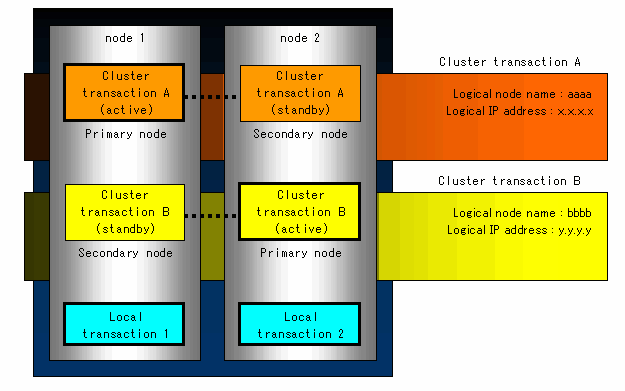
To operate the volume of cluster transaction A by backup management or replication management, add an AdvancedCopy Manager to cluster transaction A.
To operate the volume of cluster transaction B by backup management or replication management, add an AdvancedCopy Manager to cluster transaction B.
To operate the volume of node 1 by backup management or replication management, create local transaction 1.
To operate the volume of node 2 by backup management or replication management, create local transaction 2.
There are three types of AdvancedCopy Manager: Storage Server, Storage Management Server, and Tape Server.
A similar rule holds for cluster systems. A cluster system with AdvancedCopy Manager's Manager function installed is referred to as a Storage Management Server, and a cluster system with AdvancedCopy Manager's Agent function installed is referred to as a Storage Server.
Cluster systems with both the AdvancedCopy Manager's Manager function and AdvancedCopy Manager Tape Manager function installed are referred to as Tape Servers, as are cluster systems on which the AdvancedCopy Manager's Agent Manager function and AdvancedCopy Manager Tape Manager function are installed.
These categories are known as server types.
When AdvancedCopy Manager operates in a cluster system, Storage Server operations are referred to as Storage Server transactions, Storage Management Server operations are referred to as Storage Management Server transactions, and Tape Server operations are referred to as Tape Server transactions. These categories are known as server transaction types.
The server types used in AdvancedCopy Manager's cluster operation and the server transaction types that can operate on different servers are shown in the following table:
|
Storage Management Server transaction |
Storage Server transaction |
Tape Server transaction |
|
|
Storage Management Server |
Yes |
Yes(*1) |
No |
|
Storage Server |
No |
Yes(*1) |
No |
|
Tape Server (AdvancedCopy Manager's Manager function and the AdvancedCopy Manager Tape Manager function) |
Yes(*2) |
Yes(*2) |
Yes(*2) |
|
Tape Server (AdvancedCopy Manager's Agent function and the AdvancedCopy Manager Tape Manager function) |
No |
Yes(*2) |
Yes(*2) |
Notes:
Yes(*1) : The transactions that can be performed in cluster systems. Multiple cluster transactions can be performed in mutual standby systems.
Yes : The transactions that can be performed in cluster systems.Operation in a mutual standby system is only possible with a single transaction.
Yes(*2) : The transactions that can be performed in cluster systems. Operation in a 1:1 active/standby system is only possible with a single transaction.
No : Transaction not included in package.
Storage Server transactions can be included in multiple cluster transactions within a cluster system. This means that Storage Server functions can be used with each cluster transaction. On a network, users cannot tell whether a system is clustered, so it will appear as though there are multiple Storage Servers even when there is only one physical cluster system.
However, it is not possible to divide Storage Management Server transactions among multiple cluster transactions. Storage Management Server transactions are performed as a single cluster transaction on a cluster system.
Storage Management Server transactions and Storage Server transactions must be included in each cluster transaction that uses AdvancedCopy Manager functions. However, see "Combined operation with the scalable class" for information about combined operation with scalable class transactions.
An AdvancedCopy Manager Storage Management Server can operate as both a Storage Management Server and a Storage Server. (For details, see "Overview of installation procedures for different operation types" in the ETERNUS SF AdvancedCopy Manager Installation Guide for the relevant operating system.) Similarly, Storage Management Server transactions can perform both Storage Management Server transactions and Storage Server transactions. (Storage Management Server transactions include the functions of Storage Server transactions.)
The AdvancedCopy Manager Tape Server must have the AdvancedCopy Manager Tape Manager function installed, and it is also necessary to install the Manager or Agent function of AdvancedCopy Manager beforehand.
To perform Storage Management Server transactions on a Tape Server, install AdvancedCopy Manager's Manager function.
To perform Storage Server transactions on a Tape Server, install AdvancedCopy Manager's Agent function.
To perform Tape Server transactions only, install AdvancedCopy Manager's Agent function.
When AdvancedCopy Manager's Manager function and AdvancedCopy Manager Tape Manager function are installed, the AdvancedCopy Manager Tape Server can operate as a Storage Management Server, a Storage Server, and also a Tape Server.
When AdvancedCopy Manager's Agent function and the AdvancedCopy Manager Tape Manager function are installed, the AdvancedCopy Manager Tape Server can operate as a Storage Server and a Tape Server. See "Overview of installation procedures for different operation types" in the ETERNUS SF AdvancedCopy Manager Tape Backup Installation Guide for more information.
Similarly, when AdvancedCopy Manager's Manager function and the AdvancedCopy Tape Manager function are installed, Tape server transactions can perform Storage Management Server transactions, Storage Server transactions, and Tape Server transactions.
Additionally. when AdvancedCopy Manager's Agent function and Tape Manager function are installed, Tape Server transactions can perform Storage Server transactions and Tape Server transactions.
The transaction types of an AdvancedCopy Manager application in AdvancedCopy Manager cluster operation are listed in the following table. The table describes, for each applicable transaction, the active and the standby states.
|
Application (function) |
Storage management server transaction |
Storage server transaction |
Storage local transaction |
|
Configuration management Manager |
Active on primary node |
- |
- |
|
Transaction configuration management Agent |
Active on primary node |
Active on primary node |
- |
|
Local configuration management Agent |
- |
- |
Active on each node |
|
Repository |
Active on primary node |
- |
- |
|
Authentication management |
Active on primary node |
- |
- |
|
Transaction replication management |
Active on primary node |
Active on primary node |
- |
|
Local replication management |
- |
- |
Active on each node |
|
Transaction backup management |
Active on primary node |
Active on primary node |
- |
|
Local backup management |
- |
- |
Active on each node |
When a mutual standby system using the storage management servers is built, all Storage management server transactions must be operated on the same logical server in a cluster. It is not possible to divide for operation the resources of Storage management server transactions between two or more logical servers.
The resources of Storage server transactions can be divided for operation on two or more logical servers. That is, whether a Storage server transaction is to be operated can be selected for each logical server. Storage local transactions cannot operate in a cluster.
The method for performing backup operation or replication operation about the transaction volume in scalable class is explained.
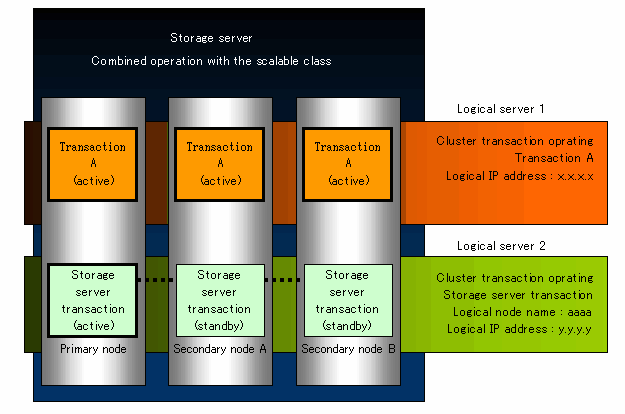
AdvancedCopy Manager does not support the scalable class. Therefore, the resource of AdvancedCopy Manager cannot be added to a scalable class.
When performing backup operation and replication operation to the transaction volume in scalable class, create the cluster service of new Storage server transaction or Storage management server transaction. When cluster service in scalable class is three or more nodes, create the Storage server transaction in cascade topology. When cluster service in scalable class is 2 nodes, create the Storage server transaction in mutual standby system.
The backup operation and replication operation are performed from the Storage server transaction to the transaction volume in scalable class.
The above figure shows Combined operation of userApplication in scalable class, and cluster service of Storage server transaction. The backup operation for volume on transaction A is performed from the Storage server transaction. The backup operation's information is managed in storage server transaction.

For notes on combined operation with transactions in scalable operation, see "Notes on cluster operation" in the ETERNUS SF AdvancedCopy Manager Operator's Guide.
This section explains how to provide the environment construction to operate AdvancedCopy Manager on the cluster system.
This section explains how to provide the cluster environment construction for a Storage management server transaction or Storage server transaction on the cluster system of the type with 1:1 standby system.
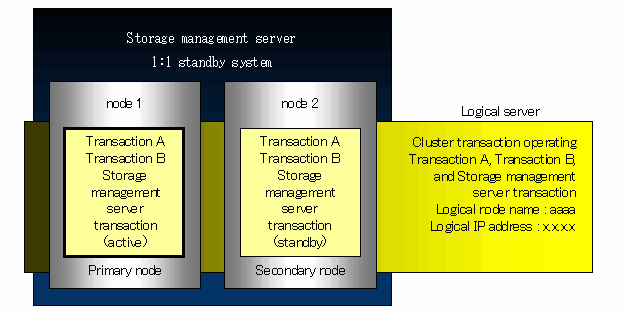
To build Storage management transactions, install the Manager function of AdvancedCopy Manager on both nodes.
To build Storage server transactions, install the Agent function of AdvancedCopy Manager on both nodes.
See "Installation of AdvancedCopy Manager," "Preparation of customize of Storage management server transaction and Storage server transaction," and "Customization of Storage Management Server Transactions and Storage Server Transactions" in this manual for information on AdvancedCopy Manager installation and customization.
In the above configuration, the AdvancedCopy Manager functions are installed on node 1 and node 2 to construct the Storage management server transaction.
This section explains how to construct a cluster environment for Tape Server transactions in a 1:1 active/standby cluster system.
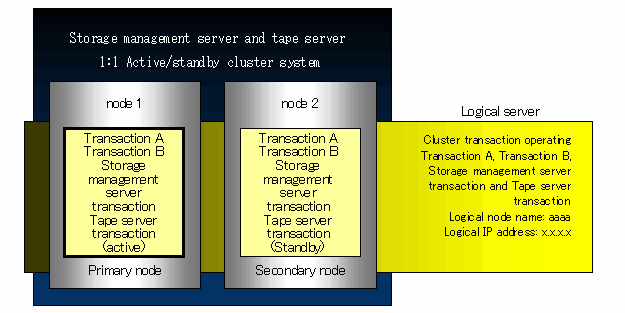
To create Storage Management Server transactions and Tape Server transactions, install AdvancedCopy Manager's Manager function and the AdvancedCopy Manager Tape Manager function on both nodes.
To create Storage Server transactions and Tape Server transactions, install the AdvancedCopy Manager's Agent function and the AdvancedCopy Manager Tape Manager function on both nodes.
To create Tape Server transactions only, install AdvancedCopy Manager's Agent function and the AdvancedCopy Manager Tape Manager function on both nodes.
For details on installing and customizing AdvancedCopy Manager, see "Installing AdvancedCopy Manager", "Preparations for customizing Storage Management Server transactions, Storage Server transactions and Tape Server transactions", and "Customizing Tape Server transactions".
In the configuration shown in the above diagram, to create both Storage Management Server transactions and Tape Server transactions, both AdvancedCopy Manager's Manager function and the AdvancedCopy Manager Tape Manager function are installed on Node 1 and Node 2.
This section explains how to provide the cluster environment construction for a Storage management server transaction or Storage server transaction on the cluster system of the type with mutual standby system.
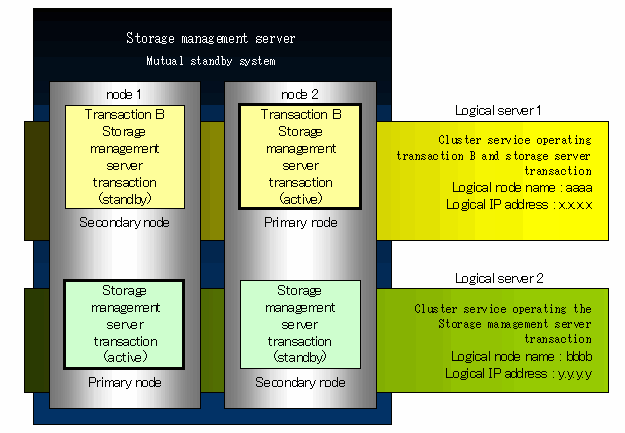
To configure a mutual standby environment for Storage management server transactions and Storage server transactions, install the Manager function of AdvancedCopy Manager on both nodes.
To configure a mutual standby system for Storage server transactions, install the Agent function of AdvancedCopy Manager on both nodes.
See "Installation of AdvancedCopy Manager," "Preparation of customize of Storage management server transaction and Storage server transaction," and "Customization of Storage Management Server Transactions and Storage Server Transactions" in this manual for information on AdvancedCopy Manager installation and customization.
In the above configuration, the AdvancedCopy Manager functions are installed on node 1 and node 2 to construct the Storage management server transaction and the Storage server transaction.
This section explains how to provide the cluster environment construction for a Storage management server transaction or Storage server transaction on the cluster system of the type with n:1 standby system.
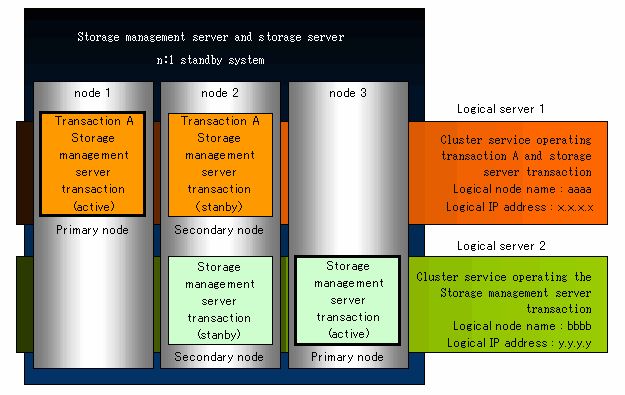
To configure an n:1 standby environment for Storage management server transactions and Storage server transactions, install the Manager function of AdvancedCopy Manager on the node where Storage management server transactions are built. Then, install the Agent function of AdvancedCopy Manager on the other nodes.
To configure an n:1 standby environment for Storage server transactions, install the Agent function of AdvancedCopy Manager on all nodes.
See "Installation of AdvancedCopy Manager," "Preparation of customize of Storage management server transaction and Storage server transaction," and "Customization of Storage Management Server Transactions and Storage Server Transactions" in this manual for information on AdvancedCopy Manager installation and customization.
In the above configuration, the AdvancedCopy Manager functions are installed on node 2 and node 3. The AdvancedCopy Manager Agent functions are installed on node 1. Because the AdvancedCopy Manager manager functions are installed, node 2 need not install the AdvancedCopy Manager Agent functions.
This section explains how to provide the cluster environment construction for a Storage management server transaction or Storage server transaction on the cluster system of the type with cascade topology and type with priority transfer.
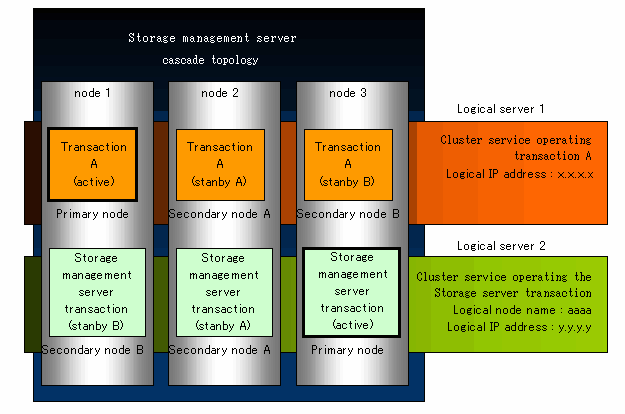
To configure a cascade topology environment and a priority transfer environment for Storage management server transactions, install the Manager function of AdvancedCopy Manager on all nodes.
To configure a cascade topology environment and a priority transfer environment for Storage server transactions, install the Agent function of AdvancedCopy Manager on all nodes.
See "Installation of AdvancedCopy Manager," "Preparation of customize of Storage management server transaction and Storage server transaction," and "Customization of Storage Management Server Transactions and Storage Server Transactions" in this manual for information on AdvancedCopy Manager installation and customization.
With the above-mentioned composition, install the Storage management server in all nodes.
Contents
Index
 
|